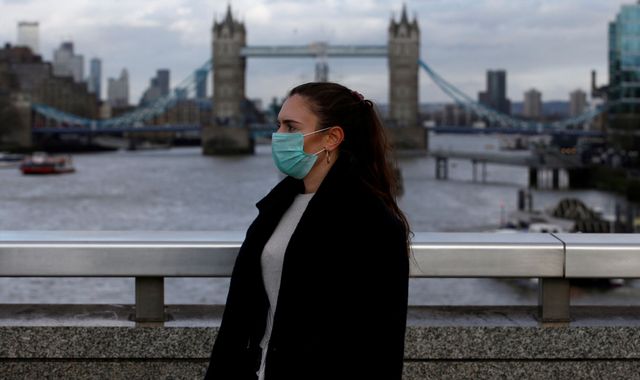Coronavirus: Total of 85 cases of COVID-19 now confirmed in UK
Written by News on 04/03/2020
The UK has seen its biggest daily increase in coronavirus cases, with 85 people now confirmed to have the virus.


Thirty-four new patients with COVID-19, the disease caused by coronavirus, were confirmed in the UK on Wednesday, with 32 in England and two in Scotland.
The Department of Health said three of the new cases in England contracted the virus in the UK, raising fears that community transmission may now be taking hold.
It comes after England’s chief medical officer told Sky News that a serious coronavirus outbreak in Britain is “almost certain” with “some deaths” expected.
Professor Chris Whitty, who has been helping to coordinate the government’s planning for a potential COVID-19 epidemic, highlighted a six-week window in which the UK’s action could be stepped up.
He told Sky News’ Kay Burley@Breakfast show: “With all epidemics, what happens is they start off very slowly and then they gradually gather momentum and then they suddenly go up relatively fast.
“We usually have a reasonable period of warning before that happens, and we are modelling this out quite carefully, from the time that we get established transmission in the UK… which I think at this time is more likely than not.
“Then there will be a number of weeks, probably about six weeks before we start to see a significant amount of transmission in the UK.
“It is not something we should be alarmed about, but something we should be prepared for and therefore respond to.”
Prof Whitty said the disease was spreading significantly across the world, including Europe, so it was unlikely the UK would “escape” a major hit, which he said could last for up to several months.
“Almost certain there will be more cases in the UK, probably a lot more cases… and we would expect some deaths,” he added.
The new UK coronavirus cases reported on Wednesday included two people from Carlisle who had both had recently returned from a trip to northern Italy. One is a member of healthcare staff at the Cumberland Infirmary.
Another patient who was admitted to Wythenshawe Hospital in Manchester has also tested positive for COVID-19.
The two Scottish patients were from the Grampian and Ayrshire areas. One had travelled to northern Italy and the other had had contact with a person who was known to have already tested positive for the disease.
The prime minister announced on Wednesday new sick pay changes so that anyone self-isolating due to coronavirus is paid from day one rather than day four as current rules state.
Boris Johnson told MPs that people who self-isolate are “helping to protect all of us by slowing the spread of the virus”.
In its 27-page plan to deal with a major outbreak, the government has said up to one in five workers could be off sick during a peak in coronavirus cases.
In a worst case scenario, it said up to 80% of the population could become infected, with people hospitalised with pneumonia and a relatively high death rate among the elderly and frail.
It said police could be reduced to deal with just very serious crimes, and the army drafted in, if necessary, to maintain public order.
The government would consider closing schools, encourage working from home and the reduction of large-scale gatherings to slow the spread of the disease.
Non-urgent medical procedures could also be postponed, should the NHS be closed to all but those in need of critical care.
Prof Whitty said such procedures would only be delayed in the event of a “coronavirus epidemic wave”.
He added that a face mask was only really useful to people who have already been diagnosed with COVID-19, for stopping the spread of infection.
A letter to NHS trusts has been published telling them to ramp up their plans for tackling the virus, including seeing patients via video-link.
The government has also launched an advertising campaign in the fight against coronavirus, with hand-washing the central advice.
People should wash their hands for 20 seconds and use soap and water or hand sanitiser, with the adverts stressing the importance of coughing or sneezing into tissues.
:: Listen to the Daily podcast on Apple Podcasts, Google Podcasts, Spotify, Spreaker
On Tuesday, NHS England declared coronavirus a level four incident – the highest level of emergency preparedness planning.
Under the level four alert, all hospitals in England have been told to “assume that they will need to look after COVID-19 cases in due course”.
In other global developments:
- 79 people in Italy have died in Europe’s biggest outbreak, as the country considers closing all schools, universities, cinemas, theatres and most public events until mid-March
- Iran announced 92 people had died from coronavirus, the highest death toll outside China
- The quarantined dog of a coronavirus patient in Hong Kong could be the first case of human-to-animal transmission, animal health experts said
- The World Health Organisation said about 3.4% of those diagnosed with COVID-19 have died
- The World Bank announced an initial $12bn (£9.3bn) to assist countries grappling with the health and economic impacts of the outbreak
- Scientists in China studying the outbreak say they have found that two main strains of the virus are circulating in humans and causing infections
- More than 94,000 confirmed and suspected cases have been recorded globally, including more than 3,200 deaths, according to Johns Hopkins University, which is tracking the outbreak
Virus Outbreak: Global Emergency – Watch a special Sky News programme on coronavirus at 6pm weekdays
(c) Sky News 2020: Coronavirus: Total of 85 cases of COVID-19 now confirmed in UK







